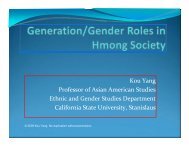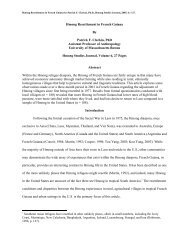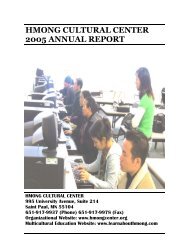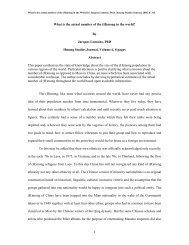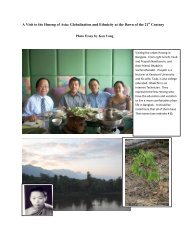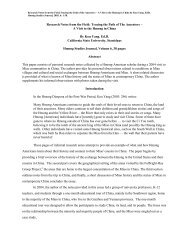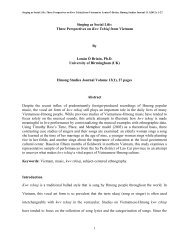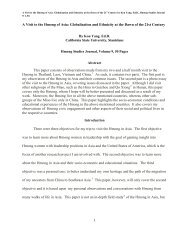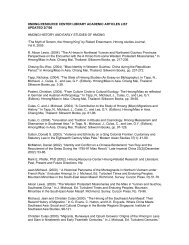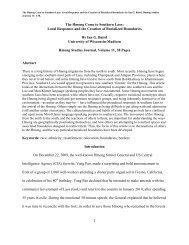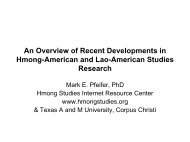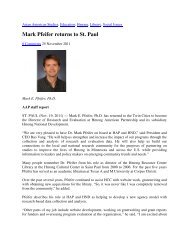Hmong and Lao Refugee Women - Hmong Studies Internet ...
Hmong and Lao Refugee Women - Hmong Studies Internet ...
Hmong and Lao Refugee Women - Hmong Studies Internet ...
Create successful ePaper yourself
Turn your PDF publications into a flip-book with our unique Google optimized e-Paper software.
<strong>Hmong</strong> <strong>and</strong> <strong>Lao</strong> <strong>Refugee</strong> <strong>Women</strong>: Reflections of a <strong>Hmong</strong>-American Woman Anthropologist by Dia Cha, Ph.D. <strong>Hmong</strong> <strong>Studies</strong> Journal,<br />
2005, 6: 1-35.<br />
Moreover, numerous interviews with these women indicated that <strong>Hmong</strong> women held to a significantly<br />
different set of concerns than did the men. As one very common example, most <strong>Hmong</strong> men tended to<br />
concern themselves with the possibility of repatriation <strong>and</strong> resettlement, <strong>and</strong> much of their conversation<br />
reflected this concern. In these conversations, considerations of the best means by which to maintain<br />
cultural identity <strong>and</strong> political sovereignty came generally to the fore, <strong>and</strong> it was in the consideration of<br />
cultural identity <strong>and</strong> political sovereignty that there emerged a powerful desire to preserve such maledominant<br />
cultural practices as polygyny <strong>and</strong> those involved in certain aspects of burial ritual. In their<br />
discussions of emigration <strong>and</strong> resettlement to new nations, these men expressed such anxieties relative to<br />
power over "their" women as, e.g., that the women would slip into affairs with American men; they<br />
would ab<strong>and</strong>on their husb<strong>and</strong>s <strong>and</strong> children; that they would call police to intervene in domestic disputes,<br />
<strong>and</strong> so on. As they weighed their options, these same men expressed no such concerns about potential<br />
female anxieties.<br />
As he assessed the possibilities inherent in repatriation, the <strong>Hmong</strong> male worried, also, that he<br />
might be arrested <strong>and</strong> punished, or even killed, by the <strong>Lao</strong> government – yet he invariably offered a<br />
cavalier dismissal of possible consequences to the women <strong>and</strong> children for whose welfare he was<br />
responsible. While some men even ventured to speculate on the possibility of becoming a village<br />
headman if repatriation were effected – an achievement within the reach of many – all recognized that to<br />
become a governor of, or even a councilman in, an American city, even in an American city with a<br />
relatively large <strong>Hmong</strong> voter bloc, was highly unlikely. As such pleasant political fancies were b<strong>and</strong>ied<br />
about among the <strong>Hmong</strong> refugee male population, the wishes <strong>and</strong> aspirations of the <strong>Hmong</strong> female were a<br />
matter of little or no concern.<br />
For the <strong>Hmong</strong> woman, meanwhile, such political glories were a matter of indifference. For the<br />
<strong>Hmong</strong> woman, rather, the highest priority in life tended to be the improvement of the quality of life for<br />
herself <strong>and</strong> her children. Indeed, for many of these <strong>Hmong</strong> women, repatriation equated with the<br />
institution of polygyny <strong>and</strong> such other institutions of <strong>Hmong</strong> life in <strong>Lao</strong>s as upl<strong>and</strong> rice farming, rice<br />
pounding, the manual transport of water, <strong>and</strong> the cultivation of opium. By contrast, the same women<br />
16



